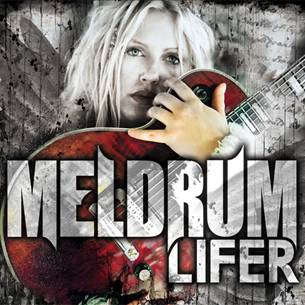
Album Review: Meldrum - "Lifer"
Meldrum is the brainchild of guitar player Michelle Meldrum, who was the driving force behind what was intended to be a female-fronted band that would take the world by storm. That was until Michelle passed away suddenly in May of 2008, the result of a growth that restricted blood flow to her brain. What had been an up and coming, promising train was suddenly derailed, with no one really knowing is anyone would ever hear the name Meldrum again.
At the time, Michelle had completed composition of the band’s third, highly anticipated album “Lifer,” which was suddenly left in a nebulous air, slated for a release in 2009 that never happened. However, Gene Hoglan, he of every-band-ever was also a part of Meldrum, and refused to let the project go unfinished. Teaming up with surviving members Michelle Madden and Laura Christine, Hoglan made it his personal mission to the release “Lifer” as a tribute to his departed friend.
What we have here is a glimpse of what could have been which is both eye-opening and bittersweet. If you traveled down the highway of Pantera and took the exit for Life of Agony street, you’d end up in the town of Meldrum, a place where the music ear-splitting, the gasoline is only available in the highest octane and everyone you meet either owns a shotgun or is straight up tougher than you.
To hear an album with this kind of pure, nearly-southern metal root dip its toe into the distorted sludge factory that was the late ‘90s is to look at the calendar and wonder what year it is. No one on top of no one makes a song like the swinging, badass “Blackened Blue” anymore. It’s an amazing, welcome anachronism; a model structure of its era time-warped a dozen years into the future. The swagger and charm of “Blackened Blue” screams all things firearms, gin-soaked dive bar and monster truck.
There are many different facets of Meldrum that are represented on “Lifer,” and the final product features a pleasant mix of multiple styles, including but not limited to White Zombie-style sludge, Alice in Chains grunge and Type O Negative-doom. To listen to “Greenlee,” “Home” and “68 Blonde” is to hear three different versions of Meldrum, each with its own characteristics and advantages.
Aside from the impossible swagger of “Blackened Blue,” the album culminates in “Walking Point,” a song that incorporates and effortlessly weaves together perhaps six or eight styles of heavy metal, resulting in a song that gets value out of every second of its four and a half minute runtime. The song itself is a journey through metal’s back forty, winding from power riffs to drawn out bridges in several flashes.
The versatility of Meldrum is a double edged sword. While it’s refreshing to hear that the band had more than one musical idea, some of them work less well than others. The low-key chanting chorus of “Money Shot” juxtaposes with the harsh, screamed verses, but the end result comes off as a sort of junior Big Dumb Face.
Concurrently, the album turns to harsh vocals only a couple of times, but each time the music seems to simplify accordingly, ending up in tracks like “Mayhem” which devolve into the all-too familiar sound of modern American metal in the style of Lamb of God or any other band of their ilk. It’s not that these are bad songs, as that is subjective to taste more than anything else. Rather, the issue is that in so doing, Meldrum loses their uniqueness and creativity, which are their greatest assets.
Meldrum’s ability to be similar but different on every track is a showcase of writing talent, and that in turn is what makes the album a slightly bitter pill. With Michelle Meldrum’s passing, it’s an obvious conclusion to draw that the world may not see more of this kind of songwriting, which is sad. Who, one naturally asks, will pick up the torch?
Meldrum’s “Lifer” is one of those albums that might become a favorite despite its flaws. The good moments on the album are practically transcendently good; throwbacks to an era of metal too often brushed over by modern acts. These songs overcome the few cosmetic flaws the album possesses, and proves that a record doesn’t have to be perfect from end to end to be a classic. This is a labor of love for both metal and for a departed friend, and listeners would be foolish to let it go by without checking it out.

